Posidonia Seagrass Meadows

Overview
The conservation of the endemic Posidonia oceanica seagrass meadows, the forests of the Mediterranean, have been a key focus of Archipelagos Institute for over 15 years. Archipelagos’ research focuses on the production of detailed maps depicting the exact location of the meadows, the assessment of their biodiversity and impacts caused by human activities, the quantification of the potential for carbon storage by seagrass meadows in the Aegean, as well as the assessment of the meadows as a potential “sink” for microplastic pollution. At a day and age when discussions on the increasing biodiversity loss of our planet have become commonplace, our work to replant seagrass gardens aims at the development of practical solutions to help reverse this trend. Our work aims to promote the enforcement of the existing legislation to efficiently protect our forests and seas, before it’s too late.
Posidonia seagrass meadows make up one of the oldest organisms on earth having been dated to exceed 10,000 years. It is worth noting that these and other equivalent marine ecosystems can absorb 35 times more carbon than tropical rainforests. Remarkably, more than half of the oxygen we breathe comes from the sea. Posidonia has the capability to produce up to 20lt of oxygen per square meter daily. These meadows also provide a safe shelter to biodiversity as they house over 1,000 species of marine animals and 300 species of marine plants.
The continued destruction of Posidonia seagrass meadows that takes place in the Greek seas, where no effective conservation measures are being applied, does not only cause important consequences to fisheries (reduction in fish stock productivity) and in tourism (beach erosion phenomena), but also deprives us from the valuable services that these important ecosystems provide globally to mitigate the effects of climate change.
As the destruction of seagrass meadows continues to increase, due to anthropogenic factors such as uncontrolled anchorage of recreational boats, illegal fishing (outside fishing zones) with towed fishing gear (trawlers, seiners), intensive aquaculture practices and many more, it is pressing now more than ever to implement effective conservation measures. Archipelagos aims to contribute to this by bridging important knowledge gaps related to these essential habitats and by promoting their protection for the current and future generations.
The rate of destruction of Posidonia meadows is alarming. According to official data, at least 34% of the Posidonia meadows in the Mediterranean have already disappeared. This not only places the health and productivity of our seas at risk, but also the survival and economic stability of millions of people around the Mediterranean, who depend on fisheries, tourism and the marine resources.
Archipelagos’ conservation efforts are carried out in close cooperation with local communities, where the exchange of knowledge and gathering of Local Ecological Information from the local fishing communities is an invaluable aspect of this work.
By combining multidisciplinary research in cooperation with the local communities, Archipelagos aims to protect and halt the ongoing destruction of the forests of our seas.

Research & Conservation
Seagrass meadows are increasingly being destroyed due to anthropogenic activities such as uncontrolled anchoring of recreational boats, illegal fishing using towed fishing gear (trawlers, seiners) and intensive aquaculture practices. These fragile habitats are also at risk due to the effects of climate change.
As an active solution directed towards positive change, the Archipelagos Institute has developed a project dedicated to the regeneration of the degraded meadows. The aim of this project is to restore patchy Posidonia oceanica meadows in the Mediterranean by replanting naturally detached seagrass shoots in areas where coverage has declined.
It is as urgent as ever to start implementing practical solutions to help reverse the loss of the habitats. With this aim in mind seagrass planting has been carried out by Archipelagos since 2018. In collaboration with scientists from the University of Essex, UK, after years of experimental replanting, Archipelagos has developed innovative underwater replanting methodologies using both seagrass fragments, as well as seeds. This is based on low-cost and high-yield practices, through which extensive planting can be implemented using natural and biodegradable materials.
Archipelagos aims to spread this methodology developed to encourage planting of Posidonia meadows in other parts of the Aegean and Mediterranean, thus making a significant contribution to reversing the destruction of these underwater forests.



Seagrass meadows are one of the major coastal ecosystems contributing to ‘Blue Carbon’ storage, alongside mangroves and tidal marshes. According to scientific literature, seagrass meadows and other equivalent coastal habitats capture 35 times more carbon than rainforests. Every square meter of a healthy seagrass meadow produces 20 lt of oxygen daily for the seas and the atmosphere. But what are the specific figures for Posidonia seagrass in the Aegean Sea? Understanding the capacity of seagrass to store carbon is critical to future research as a possible solution to mitigate global climate change.
Archipelagos Institute in collaboration with expert scientists from the Biology Departments of the University of Essex and University of Portsmouth, UK carry out a joint research aiming to quantify the capacity by which Posidonia seagrass meadows in the Aegean can sequester (i.e. capture) carbon. It examines how the seagrass meadows of different depths, densities, and other factors play a role in the sequestration of blue carbon. With the usage of specialized loggers, research so far has demonstrated that not all seagrass habitats are equal. If seagrass meadows are to play a role in mitigating CO2 emissions, variability in primary productivity within seagrass meadows needs to be accounted for to produce comprehensive autochthonous carbon sequestration estimates. By assessing the productivity of Posidonia meadows in the Aegean, we can estimate the extent to which these seagrass beds contribute to this valuable ecosystem service. Further, we can estimate the contribution to global warming in case carbon storage loses efficiency.


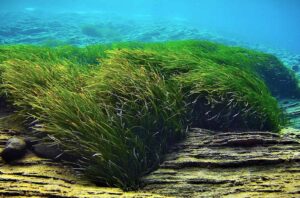

A key prerequisite for effectively managing and conserving the seagrass meadows is creating accurate maps which are essential for legislation enforcement. Given the poor quality of the official seagrass maps provided by the national authorities, it has become a priority for Archipelagos to generate detailed maps depicting the exact location of these protected habitats in as many marine regions as possible.
In deeper waters mapping is carried out via Archipelagos’ research vessel, the Aegean Explorer, using the multibeam sonar, a biomass scanner and several ROV systems. The multibeam provides information about the seafloor morphology, while the biomass scanner reveals the presence of benthic habitats and fish stocks. These advanced technologies offer valuable insight into the presence of seagrass habitats, resulting in high-resolution distribution maps.
For shallower waters Archipelagos has developed a novel methodology collecting data with the use of kayaks that are equipped with sonar. In this way we map the presence of seagrass along predefined transects, while in combination with data collected from drones and satellite, the data collected by kayaks is used to create a detailed habitat maps that depict the distribution of Posidonia meadows using Geographic Information Systems.
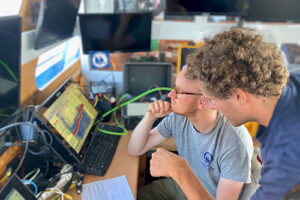

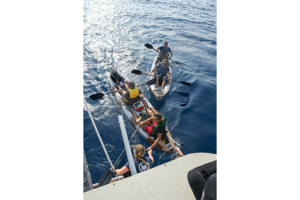
According to official data over 34% of the seagrass meadows in the Mediterranean have already been destroyed and even this is probably an underestimation of the true extent of the ongoing destruction. Due to their particularly slow growth rate (≅ 6cm / year) in combination with human impacts and the effects of climate change, when a Posidonia meadow is destroyed, it will take centuries to grow again. Therefore the efficient protection of those seagrass meadows that are still surviving is of utmost importance.
Through targeted research projects, Archipelagos works to quantify the extent of the key factors of threat which include: uncontrolled anchorage, destructive fishing practices as well as intensive aquaculture. This research is essential in order to promote the enforcement of the existing national, EU and international legislation that is in place for the protection of seagrass meadows but is currently not being enforced.
In Archipelagos we also work to develop tangible solutions and promote their protection, such as the design and piloting of sustainable mooring systems, as a solution to address the extensive damage caused by the uncontrolled anchorage of recreational boats, which every summer season results in the destruction of hundreds of square meters of seagrass meadows every day.

The Local Ecological Knowledge (LEK) of fishing communities in relation to environmental and ecological processes of their area is an invaluable source of information and data for Archipelagos’ researchers. This exchange of knowledge is made possible based on the relationship of mutual trust and cooperation with the local communities that Archipelagos has been developing for over two decades.
For decades, Local Ecological Knowledge was ignored by the scientific community. Only recently the applicability of LEK data for mapping marine benthic habitats has become increasingly popular among scientists and environmental managers around the world. Unfortunately, there is limited information about which factors affect the quality of LEK as protocols for recording empirical data are yet to receive widespread use.
Archipelagos research uses artisanal fishers’ LEK to map the distribution of Posidonia seagrass meadows in selected Greek islands, while also developing research protocols that determine the quality of the LEK data through a comparison with remote sensing-based and other seagrass distribution data collected during the research surveys. This research also aims to provide a better understanding of which factors improve the quality of artisanal fishers’ LEK. Our research has shown that fishers’ LEK habitat maps can present a very high accuracy exceeding 90%, while the level of fishing experience is a direct indicator of the quality of empirical data.
Archipelagos uses LEK to gather data and information for many species, habitats and anthropogenic activities. By joining forces we can help to bridge gaps between local stakeholders and scientists, by building community trust through nurturing an environment of collaboration towards the sustainable use of the ecosystem.



Posidonia seagrass meadows act as ecosystem architects, creating a habitat of fundamental importance which also acts as a shelter, nursery and feeding ground for over 1.300 species. Understanding the status of Posidonia meadows helps the Archipelagos Institute establish conservation strategies, inform the national stakeholders of the environmental status and prevent the degradation of this crucial ecosystem.
Ιn various regions of the eastern Aegean Sea, Archipelagos researchers are undertaking studies on Posidonia meadow health and collect data following the Seagrass Watch protocol, as well as by assessing epiphyte cover and its relation with native and non-native seagrass species. We assess the health status of seagrass meadows by looking at various parameters: meadow patchiness, percentage cover of the seafloor, number of shoots, blade length, epiphyte cover of each leaf. Other environmental parameters such as the fish and invertebrate biodiversity around the meadow, the presence of non-native seagrass species and the levels of the various types of anthropogenic stressors are also important parts of our research.



Environmental DNA (eDNA) is becoming a popular tool for assessing total biodiversity as well as monitoring certain species in aquatic ecosystems. It uses traces of DNA left behind by species such as skin cells, mucus or other excretions to confirm their presence in certain locations, thus saving surveying effort and preventing misidentifications of similar-looking species. As hundreds of species may live sheltered within P. oceanica canopies, frequently visual census transects are not adequate to monitor their presence, therefore, eDNA could be the future of monitoring such cryptic or hidden species.
Archipelagos Institute, in collaboration with the University of the West of England (UWE), has been working on developing this tool, initially focusing on macroinvertebrate species. However, with eDNA being such a new method, there is still very little known about how environmental factors influence the dispersal of eDNA, therefore, a large section of the work carried out by Archipelagos and UWE has been working on improving our understanding of this interaction, using as a case study species that live fixed to the seafloor.



The accumulation and biomagnification of plastic debris and microplastic pollutants is a dire global problem affecting nearly every marine ecosystem. The characteristic of seagrass meadows to attenuate the flow of water and waves, causes sedimentation of floating particles at higher rates compared to unvegetated areas as well as an increase in microplastic deposition within these canopies. Because of this, seagrass meadows have recently been recognized to have the potential to act as an important sink for microplastic pollution.
Archipelagos Institute, Plymouth Marine Laboratory and the University of East Anglia are working together to investigate this theory by collecting seagrass blades and sediments from within the Posidonia seagrass meadows and extracting the microplastics to assess if there is an increase when compared to bare sand and other nearby marine habitats. Should our theory prove that more microplastics are found within the seagrass beds, it will highlight an important and, until now, overlooked microplastic sink, which could be causing serious impacts on the species which live within seagrass meadows.



Latest News
Scientific Publications
Confirmation of a Mass Mortality Event within a Pinna nobilis population between 2018 and 2019 in the eastern Aegean Sea, Greece
Tatton, B., LaFrance, E., Smith, D., Ward, E., Miliou, A. Confirmation of a Mass Mortality Event within a Pinna nobilis population between 2018 and 2019 in the eastern Aegean Sea, Greece. 42nd CIESM Congress 2019. Background: Pinna nobilis (L.
Is All Seagrass Habitat Equal? Seasonal, Spatial, and Interspecific Variation in Productivity Dynamics Within Mediterranean Seagrass Habitat
Ward, E., Aldis, C., Wade, T., Miliou, A., Tsimpidis, T., Cameron T. Is All Seagrass Habitat Equal? Seasonal, Spatial, and Interspecific Variation in Productivity Dynamics Within Mediterranean Seagrass Habitat. Frontiers in Marine Science 2022. Abstract: Seagrass meadows’ ability to capture
Enforcement of the European Union legislation about illegal fishing practices in the eastern Aegean Sea and its impact on the Posidonia oceanica meadows
Vlachopoulou, E. I., Wilson, A.M., Miliou, A. Enforcement of the European Union legislation about illegal fishing practices in the eastern Aegean Sea and its impact on the Posidonia oceanica meadows. The University of Edinburgh, Department of Science and Engineering, School
The use of storm fragments and biodegradable replanting methods allows for a low-impact habitat restoration method of seagrass meadows, in the eastern Aegean Sea
Ward, E.A., Meek, S.K., Gordon, D.M., Cameron, T.C., Steer, M.D., Smith, D.J., Miliou, A., Tsimpidis, T. The use of storm fragments and biodegradable replanting methods allows for a low-impact habitat restoration method of seagrass meadows, in the eastern Aegean Sea.









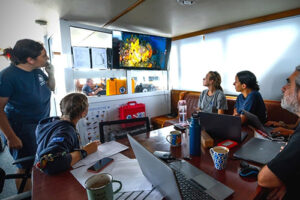
















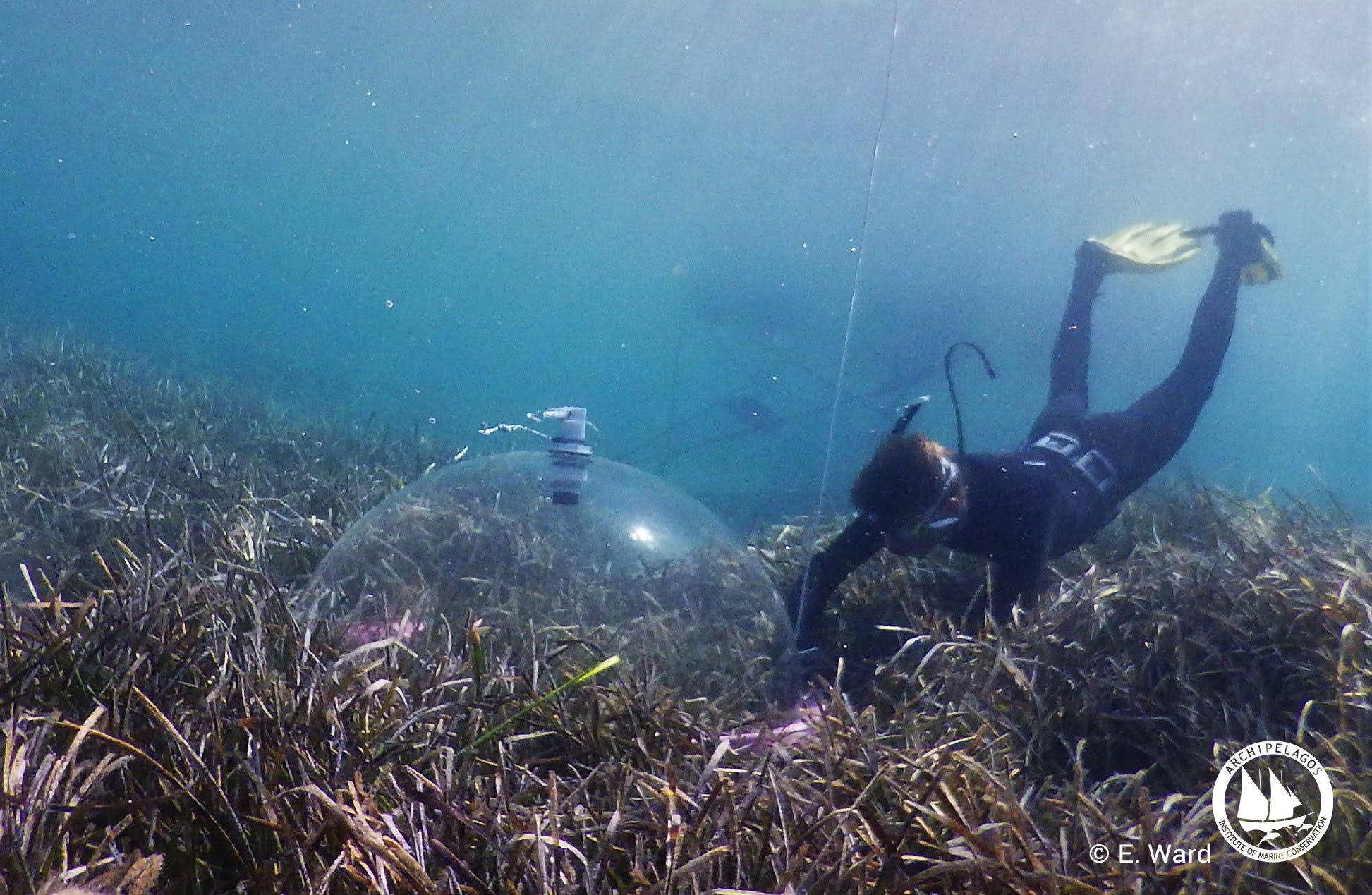
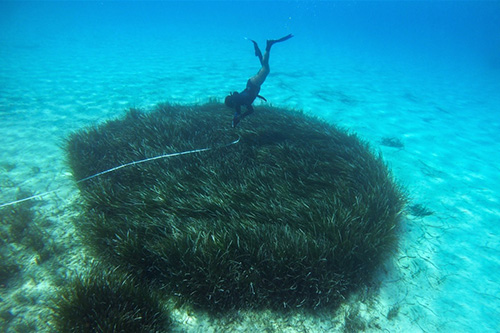

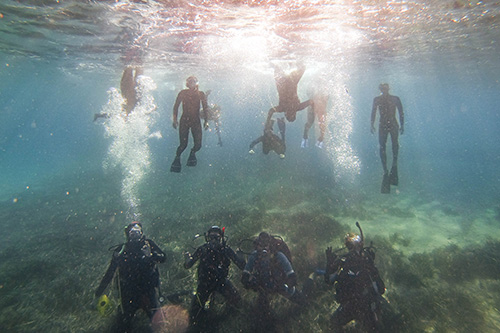



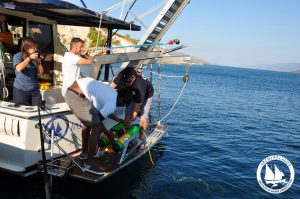
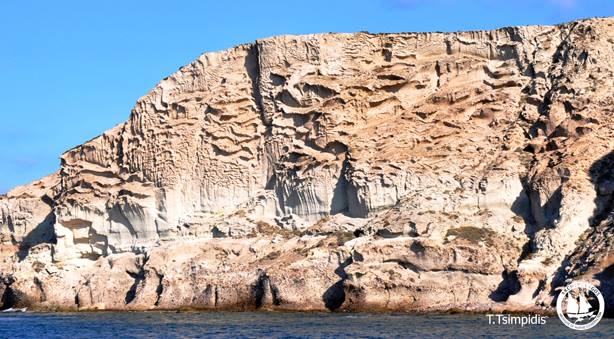


Archipelagos - Institute of Marine Conservation
Archipelagos is a Greek non-profit NGO dedicated to defending the biodiversity of our seas
Η αναγέννηση της φύσης στη θάλασσα....
Στην καρδιά της άνοιξης πλέον, παρατηρούμε συγκεντρώσεις μεγάλων κοπαδιών ψαριών να προσεγγίζουν τα ρηχότερα και θερμότερα νερά για την ιεροτελεστία της αναπαραγωγής. Το κάθε ψάρι για πολλές εβδομάδες (ή και για μήνες για κάποια είδη), απελευθερώνει ή εναποθέτει εκατοντάδες ή ακόμα και πολλές χιλιάδες αυγά - ανάλογα με το είδος.
Εάν αυτή την εποχή, που αποτελούν εύκολο στόχο, δεν διαταραχθεί η αναπαραγωγική διαδικασία, τρισεκατομμύρια γόνου ψαριών θα απελευθερωθούν και θα έχουν μία ευκαιρία επιβίωσης στις θάλασσές μας, διασφαλίζοντας και την αναγέννηση του αποθέματός τους.
Όμως επί δεκαετίες συνεχίζουμε να βλέπουμε το παράδοξο: σε κάθε κόλπο, απ’ άκρης σ’ άκρη της ελληνικής ακτογραμμής, ψαράδες (επαγγελματίες και ερασιτέχνες κάθε τύπου - από θάλασσα και στεριά), εκμεταλλευόμενοι τις συγκεντρώσεις αναπαραγωγής επιδιώκουν να αλιεύσουν τα κοπάδια των ψαριών, ενώ σε λίγους μήνες οι ίδιοι θα δηλώνουν ότι έχουν μειωθεί κι άλλο τα αποθέματα των ψαριών και αδυνατούν να επιβιώσουν.
Όλα αυτά τα ψάρια βέβαια καταλήγουν στις διάφορες αγορές, με τελικούς αποδέκτες τους πολίτες που και αυτοί με τη σειρά τους συμμετέχουν σε αυτόν τον παράλογο φαύλο κύκλο υπεραλίευσης και τελικά αδειάσματος των θαλασσών μας.
Σαφώς τη μεγαλύτερη ευθύνη για όλη αυτή την καταστροφή τη φέρει η πολιτεία, διαχρονικά για την Ελλάδα, με τεράστια κενά γνώσης και παντελή έλλειψη πολιτικής βούλησης, όμως μεγάλη ευθύνη μοιραζόμαστε και όλοι εμείς οι πολίτες που ως καταναλωτές, αλιείς ή έμποροι, συμμετέχουμε στον αποδεκατισμό των πληθυσμών των ψαριών. ... See MoreSee Less
5 CommentsComment on Facebook
Δεν είναι μόνο η αλιεία αλλά και οι εξορύξεις υδρογονανθράκων...
Εύλογο θα ήταν να αναφερθούν επίσης ότι : 1. Λόγω της συγκέντρωσης σε πυκνά κοπάδια , ο αποδεκατισμός ολόκληρου του κοπαδιού γίνεται κατα συντριπτική πλειοψηφία με τα δίχτυα , ιδιαίτερα τα κυκλωτικά (γρι-γρι). 2. Δεν αναπαράγονται όλα τα ψάρια την άνοιξη. Ψάρια με ιδιαίτερη εμπορική αξία, όπως η τσιπούρα και ο κακαρέλος αναπαράγονται το φθινόπωρο, το λαβράκι και ο κέφαλος το χειμώνα, πολλά ροφοειδή το καλοκαίρι.
Εγώ ευτυχώς μόνο με την μάσκα τα παρατηρώ.
Απόλυτα συμφωνώ
Ετοιμάζουν κρέας στα... εργαστήρια, θα κάνουν το ίδιο και με τα ψάρια! Θα τρώνε ...πλαστικά ...οι νέες γενιές...λυπάμαι πολύ...μου αναλογεί μερίδιο ευθύνης...
View more comments
Έπειτα από 2,5 μήνες καταγράψαμε τον ίδιο φυσητήρα στη μοναδική θαλάσσια περιοχή ανάμεσα στη Χίο, την Ικαρία και τη Σάμο, πάνω από τη θαλάσσια τάφρο που ξεπερνά τα 1100 μέτρα σε βάθος.
Ο φυσητήρας (Physeter macrocephalus) είναι το μεγαλύτερο οδοντοκήτος σε όλο τον πλανήτη με μήκος 8-12 μέτρα τα θηλυκά και 16-18 μέτρα τα αρσενικά και βάρος 24 και 57 τόνους αντίστοιχα. Έχει διάρκεια ζωής περίπου τα 70 έτη. Ο πληθυσμός τους στη Μεσόγειο είναι μικρότερος από 2,500 ενήλικα άτομα, ενώ η παρουσία τους αναφέρεται στις ελληνικές θάλασσες από την αρχαιότητα, με τις εντυπωσιακές για την εποχή καταγραφές του Αριστοτέλη.
Μόνο όταν γνωρίσουμε τον μοναδικό πλούτο των θαλασσών μας, μπορούμε να τις προστατέψουμε!
------------
After 2.5 months we recorded the same sperm whale in the unique marine area between the islands of Chios, Ikaria and Samos, over the trench that exceeds 1100 meters in depth.
Sperm whales (Physeter macrocephalus) are the largest toothed whales on the planet with a length of 8-12 m for females and 16-18 m for males and weights of 24 and 57 tons respectively. They have has a lifespan of about 70 years. Their population in the Mediterranean is less than 2,500 adults sperm whales
Their presence has been reported in the Greek seas since antiquity, with Aristotle's impressive records for the time.
Only when we become aware of the unique richness of our seas can we protect them! ... See MoreSee Less
9 CommentsComment on Facebook
Έχω την τύχη να δω φυσητήρα όταν ψαρεύαμε με τον πατέρα μου. Δεν θα ξεχάσω ποτέ την σκηνή αυτή όσα χρόνια και αν περάσουν. Ο πατέρας μου κοιτούσε το ψάρεμα και εγώ χάζευα την θάλασσα...εκείνη την στιγμή βλέπω στο βάθος μία τεράστια ουρά ψαριού να ανεβαίνει στην επιφάνεια της θάλασσας...φώναξα δυνατά ''μπαμπά κοίτα '' πάγωσε.... με κοιτάει και μου λέει "το ψάρεμα τέλος για σήμερα, γυρίζουμε πίσω". Στην επιστροφή αναρωτήθηκα τι ήταν αυτό. Μου εξήγησε. Την είδαμε ανοιχτά στην Ικαρία προς Κακιναγρη.
Υπέροχα πλάσματα, πρέπει να τα προστατεύσουμε .
Σας ευχαριστουμε!!! 🌺❤️
Γοητευμένη! ... ζηλεύω...και σας ευχαριστώ!
Waow!
Harris Kazasidis
Όσο γνωρίζουμε Πραγματικα Τον Πλούτο και τη "Σοφία" του ΘΑΛΑΣΣΙΟΥ ΚΟΣΜΟΥ... Τόσο Περισσότερο η Επιθυμία μας να ΤΟΝ ΠΡΟΣΤΑΤΕΨΟΥΜΕ...γίνεται ΛΑΧΤΑΡΑ...γίνεται ΕΠΙΤΑΚΤΙΚΗ ΑΝΑΓΚΗ.,!!!!! Ευχαριστούμε για την Αδιάκοπη προσπάθεια σας.!!
Να είστε πάντα καλά να προστατεύετε τον πλούτο των θαλασσών μας !!!! Ευχαριστούμε!!!! ♥️♥️♥️
View more comments
"Αντιμετώπιση της Παράνομης και Καταστροφικής Αλιείας με Μηχανότρατα εντός και εκτός της Μεσογείου" - Εκδήλωση στο πλαίσιο της 9ης Παγκόσμιας Συνδιάσκεψης για τους Ωκεανούς στην Αθήνα
H Dr Sylvia Earle (Mission Blue), η ιδιαίτερα γνωστή και διακεκριμένη Αμερικανίδα ωκεανογράφος που στα 88 της χρόνια συνεχίζει δυναμικά την προσπάθεια για την ουσιαστική προστασία των θαλασσών, μας μετέφερε την εμπειρία της αλλά και την αγωνία της, καθώς τα χρόνια περνούν αλλά οι απειλές για τις θάλασσές μας είναι όλο και πιο έντονες.
Η Αναστασία Μήλιου από το Ινστιτούτο Θαλάσσιας Προστασίας Αρχιπέλαγος και η Domitilla Senni από το Ιταλικό MedReAct, παρουσίασαν στοιχεία για την πραγματική έκταση της παράνομης και καταστροφικής αλιείας με μηχανότρατα στην Ελλάδα, την Ιταλία και σε άλλες περιοχές της Μεσογείου. Η έρευνα έγινε με βάση την ανάλυση από τα ηλεκτρονικά ίχνη των αλιευτικών σκαφών κατά τη διάρκεια 2 ετών, στο πλαίσιο της δράσης της Μεσογειακής συμμαχίας φορέων "Med Sea Alliance".
"Tackling Illegal and Destructive Bottom Trawling in the Mediterranean and beyond" - Event at the 9th Our Ocean Conference in Athens
Dr Sylvia A. Earle (Mission Blue), the distinguished American oceanographer who at 88 years of age continues her dynamic efforts for the effective protection of the oceans, shared her experience and her anguish as the years pass but the threats to our seas are becoming more and more intense.
Anastasia Miliou from the Archipelagos Institute for Marine Conservation and Domitilla Senni from the Italian MedReAct presented data on the actual extent of illegal and destructive trawling in Greece, Italy and other areas of the Mediterranean. The research was based on the analysis from the electronic traces of fishing vessels over 2 years, in the framework of the action of the Mediterranean Alliance of the "Med Sea Alliance" coallition. ... See MoreSee Less
0 CommentsComment on Facebook
"Αντιμετώπιση της Παράνομης και Καταστροφικής Αλιείας με Μηχανότρατα εντός και εκτός της Μεσογείου"
Εκδήλωση στο πλαίσιο της 9ης Παγκόσμιας Συνδιάσκεψης για τους Ωκεανούς στην Αθήνα
Ομιλητές
Dr Sylvia Earle (Mission Blue),
Αναστασία Μήλιου (Ινστιτούτο Θαλάσσιας Προστασίας Αρχιπέλαγος)
Dr Johannes Nagele (Alexander Thamm),
Domitilla Senni (MedReAct),
Dr Anna von Rebay (Ocean Vision Legal)
Τετάρτη 17 Απριλίου - 09:00 - 09:50 π.μ., Ίδρυμα Σταύρος Νιάρχος ... See MoreSee Less
3 CommentsComment on Facebook
ΜΗΧΑΝΟΤΡΑΤΕΣ..Μια ΠΑΓΙΑ...Μόνιμη ΠΛΗΓΗ... ΚΑΠΟΙΟΙ ΔΕΝ ΕΧΟΥΝ ΚΑΤΑΛΑΒΕΙ ΤΙΠΟΤΑ ΑΠΟΛΥΤΩΣ ΓΙΑ ΤΟ ΑΝΕΠΑΝΟΡΘΩΤΟ ΚΑΚΟ ΠΟΥ ΣΥΝΤΕΛΕΙΤΑΙ... ΛΙΓΟΙ Δρουν Καταστροφικά... Την Πληρώνουν ΑΠΑΝΤΕΣ.!!!!!😔😔😔 Καλή Δύναμη Στον Αγώνα Σας για Την ΠΡΟΣΤΑΣΙΑ των ΘΑΛΑΣΣΩΝ μς.!!
ας αρχίσουμε με τα τούρκικα πλοία που έχουν καταστρέψει το Ανατολικό Αιγαίο
Ας αρχίσουμε γενικά, δεν καταστρέφουν μόνο τα τούρκικα, όλα την ίδια ζημιά κάνουν. Πάλι, μόνο οι άλλοι φταίνε.
Ολοκληρώθηκε πριν από λίγο στην Κατάνια της Ιταλίας το 35ο Συνέδριο της European Cetacean Society (Ευρωπαϊκή Κοινότητα για τη Κητώδη) με γενική θεματική “Θαλάσσια Θηλαστικά και Ανθρώπινη Δραστηριότητα: Πώς είναι εφικτή η αειφόρος ανάπτυξη στις παράκτιες περιοχές; Στο συνέδριο συμμετείχαν περίπου 500 επιστήμονες και ερευνητές από όλο τον κόσμο.
Εκ μέρους του Ινστιτούτου Αρχιπέλαγος, η συντονίστρια έρευνας στα θαλάσσια θηλαστικά Beatriz Tintore συμμετείχε στο συνέδριο παρουσιάζοντας κάποια από τα αποτελέσματα της έρευνας που υλοποιούμε τα τελευταία 16 χρόνια στον πληθυσμό του λεγόμενου Κοινού Δελφινιού Delphinus delphis - είδος το οποίο σε αντίθεση με την ονομασία του είναι ιδιαίτερα σπάνιο πλέον στη Μεσόγειο. Η έρευνα βασίστηκε στην ανάλυση της ακουστικής συμπεριφοράς (υποβρύχιας επικοινωνίας) των υποπληθυσμών του είδους στο ανατολικό Αιγαίο. ... See MoreSee Less
2 CommentsComment on Facebook
👍
Έχουμε... αισιόδοξα νέα;
Ο "Τρίτωνας" με το βλέμμα στραμμένο στις θάλασσες του Αιγαίου και της Μεσογείου!
Ο Τρίτωνας είναι το νέο τρικάταρτο ιστιοφόρο που θα συνδράμει δυναμικά στη δράση του Ινστιτούτου Αρχιπέλαγος για την προστασία των θαλασσών, αντικαθιστώντας τα μικρά ιστιοφόρα.
Έπειτα από πολύμηνη και εντατική διαδικασία ολικής μετασκευής από την τεχνική ομάδα του Ινστιτούτου Αρχιπέλαγος, είναι πλέον σχεδόν έτοιμος για να διαπλεύσει μεγάλες αποστάσεις στις ελληνικές θάλασσες και τη Μεσόγειο. Είναι εξοπλισμένος με σύγχρονο εξοπλισμό, προσφέροντας τη δυνατότητα επεξεργασίας πραγματικό χρόνο περιβαλλοντικών, ωκεανογραφικών και άλλων δεδομένων που είναι απαραίτητα για να αντιμετωπίσουμε στις σύγχρονες και ολοένα και αυξανόμενες απειλές για τα θαλάσσια είδη και οικοσυστήματα.
Σύντομα η τεχνική ομάδα του Ινστιτούτου Αρχιπέλαγος θα μας ενημερώσει για την ολοκλήρωση του δύσκολου εγχειρήματος της μετασκευής του Τρίτωνα. ... See MoreSee Less
22 CommentsComment on Facebook
Vi seguiamo da Progetto MEDITERRANEA. Anche noi siamo per mare a fare attività per studiare il mare con ISPRA e altre Università. Spero di poter entrare in contatto con voi. qui il nostro sito www.progettomediterranea.com. buon vento!
Kalotaksidos! Oreo ine...
Καλοτάξιδος!
Καλά ταξίδια !!!!!
Ωραίος ο Τρίτωνας!
Καλοταξιδος!!!!
Καλά ταξίδια στό νέο σκάφος τής ομάδας πάντα με καλούς ανέμους
Καλιταξιδος ο Τριτων!!!!🌺
Καλοτάξιδος
Καλοταξιδο !!!
Καλορίζικος και καλοτάξιδος ο Τρίτωνας Σύντομα να σαλπάρει και προς Εύδηλο!
Καλές Θάλασσες!!! Καλές πορείες!!!
Συγχαρητήρια και Καλοτάξιδο!
Καλοτάξιδο 😘
Καλές θάλασσες
Συγχαρητήρια καλοτάξιδο!!!
Μπράβο και καλή ευτυχία για τον Τρίτων..
Καλοτάξιδο!!!!!! Καλές Θάλασσες!!!!
Τι όμορφο καράβι!!! Καλοταξιδο να ναι!!!
Συγχαρητήρια!!! Υπέροχη δουλειά. Καλοτάξιδο!!!
ΚΑΛΑ ΤΑΞΊΔΙΑ ΚΑΙ ΚΑΛΕΣ ΘΑΛΛΑΣΕΣ..
ΚΑΛΌ ΤΑΞΊΔΟ!!!!!!!!!
View more comments